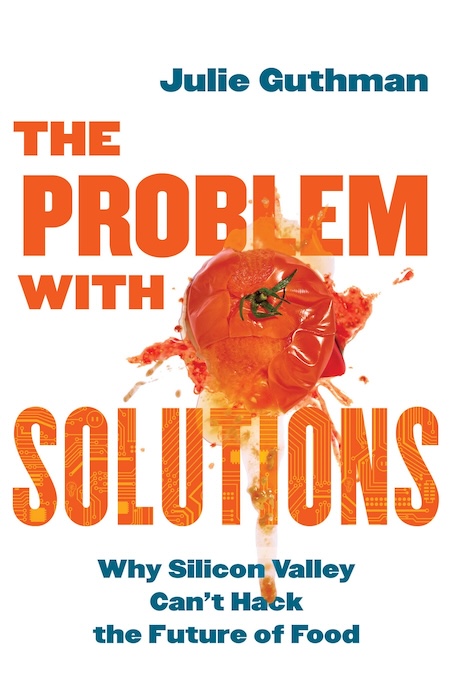
“The Problem with Solutions:
Why Silicon Valley Can’t Hack the Future of Food”
By Julie Guthman
University of California Press, 2024
272 pages, paperback, $29.95
AgFunder is a venture capital firm that invests broadly in technology, agriculture, and food. I admit that as an organic farmer and homesteader it’s a little strange that I subscribe to their newsletter. The companies highlighted by AgFunder are bathed in the Silicon Valley ideology of techno-utopianism with a strange idea of what dinner might look like in 50 years. Start-up companies in ag-tech have names like “Meatable” (not meat), “Ynsect” (yes insects), and “AI-gen” (solar-powered weeding robots), and they make big promises about solving problems. Most of these companies horrify me but then again, tell me more about those solar-powered weeders …
A new book by Julie Guthman called “The Problem with Solutions” articulates why ag-tech gives an organic farmer like me feelings of such conflicted fascination. On our small farms in Maine, we organic farmers have come to our own conclusions (if not solutions) about the challenges society faces. The culture of Silicon Valley, on the other hand, is laced with global ambition and has the venture capital to finance ideas with what Guthman calls the “techno-fix.” Ironically, technical (especially chemical) innovation is often advanced in complete absence of practical application. Very often products are developed before an application is found. This is an aspect of “solutionism” — the answer comes before, or is in disregard of, the question. Although these tendencies are often done with altruistic good intention, the results cannot amount to a positive outcome since they shun context and critical reflection.
But are there really no good ideas that come out of agricultural technology? Guthman makes the case that the Silicon Valley ethic — the techno-fix — is particularly destructive and that it is pervasive in university settings where it threatens to degrade a whole generation of entrepreneurs. However, that does not mean that there are not responsible solutions to be had. She goes on to praise ideas and processes that are responsive and rooted deeply in the community of beneficiaries. In this scenario, Guthman’s entrepreneurs are better described as activists. But their solutions are also by nature narrower than those big promises like “reinvent the food chain” (something Ynsects seeks to do). Still, I found some of Guthman’s arguments somewhat out of touch — in that she takes, in my opinion, too broad a stance against a solutions-oriented mindset, favoring a “response” approach instead. Clearly, our history can be interpreted as a long line of hubris and mess-ups. I agree that most ag-tech start-ups sound ridiculous and do real harm in distracting us from engaging deeply with systemic problems in the 21st century. But farmers are also struggling to make ends meet in the world we have inherited. We problem-solve all day long and once in a while someone does come up with a pretty good solution. It might not change the world but finding a solution is one of the most gratifying things about farming. I would hate to be hampered by the doubt that the creative process does more harm than good. Perhaps the problem with ag-tech solutions has more to do with the scope and scale of investment capital than the spark of ingenuity.
– John Bliss
This review was originally published in the spring 2025 issue of The Maine Organic Farmer & Gardener. Browse the archives for free content on organic agriculture and sustainable living practices.
